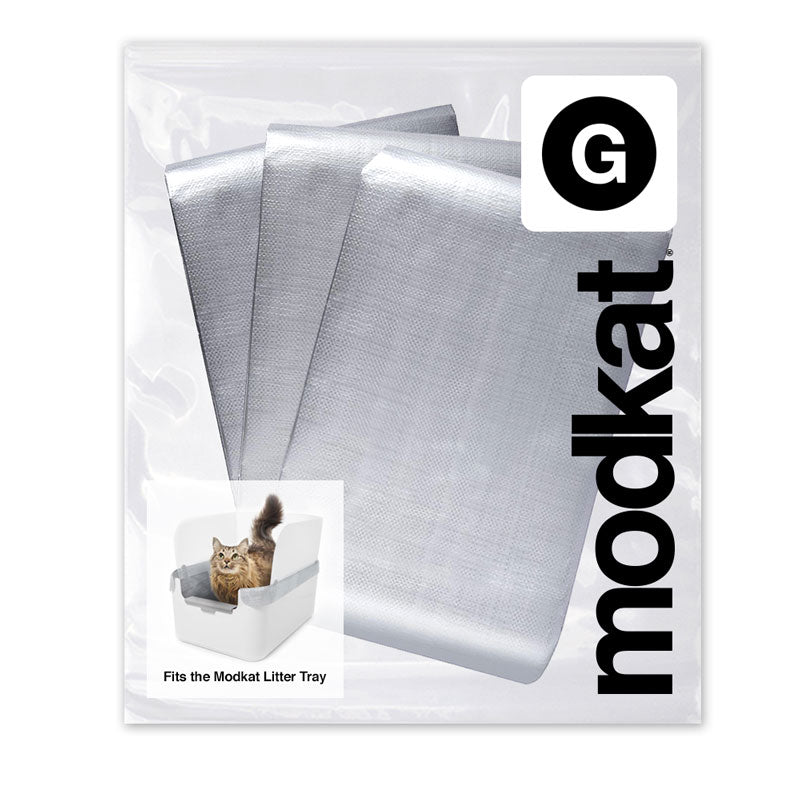Your Cart is Empty
Cat moms save 15% with code: MOM15 (ends 5/12). $12 CAD shipping on orders over $62 CAD
Cat moms save 15% with code: MOM15 (ends 5/12). $12 CAD shipping on orders over $62 CAD
Litter Boxes
Accessories
Do cats love their owners? These 5 studies say "yes!"

Cats and humans can bond in love. While cats are known for being more cautious, they can be extremely affectionate and show their love in different ways.
All the comics are clear: dogs are goofy people lovers, and cats are aloof super beings with delusions of royalty. But science doesn't support these stereotypes. In fact, researchers have uncovered evidence that cats and humans bond in ways that are just as meaningful as a canine-human connection.
Here's the scoop on feline-human bonding and how you can encourage your cat to love you back.
Do cats love you like dogs love you?
It's an age-old question: Do cats love you like dogs love you?
We understand that each cat and dog is unique in its own way, but to get a general idea of who loves whom, we turned to science. Thankfully, researchers have looked into this question for us, and what they've found is pretty amazing.
Five different studies have shed some light on the matter. Let's take a look at each piece of research in turn:
Study #1: Social Referencing - Does your cat turn to you for advice?
Social referencing is the term academics use to describe how people look around for cues about how to behave in unfamiliar situations. For example, a baby who laughs when their caregiver does is exhibiting social referencing. The baby doesn't get the joke, but they imitate the emotion anyway. One study showed that 79% of cats demonstrate social referencing by looking at humans and appearing to gauge their responses when confronted with a fan for the first time.
Source: The Scientific American
Study #2: Voice Recognition - Does your cat know your voice?
Can domestic cats recognize their humans' voices without the people being present? Researchers decided to find out. In this study, the cats sat alone in a room away from their owners, and the scientists recorded the animals' behavior after different voices called their names. Of the 20 cats, 15 appeared to distinguish their owners' voices from those of other people.
Source: Vocal recognition of owners by domestic cats (Felis catus)
The Personality Paradox - Where did that purr-fect personality come from?
Scientists observed 40 cat-human pairs over 120 hours to learn what correlations may exist between cat behavior and human personality. Their findings led these researchers to believe that friendly, extraverted cats were more likely to experience high-touch, high-interaction relationships with their humans. In other words, if you want a friendly cat, play with the animal in a concentrated way.
Source: Smithsonian Magazine
Cat Considerations - What do cats think of humans?
It's tempting to anthropomorphize our pets. We often assign them human traits or emotions they may not actually feel. For instance, we might think a pet looks lonely or guilty when the animal does not feel any such emotion. This led some feline researchers to wonder what cats actually think about their people.
After their investigation, the scientists concluded that "cats display distinct attachment styles toward human caregivers. Evidence that cats share social traits once attributed to dogs and humans alone would suggest that broader non-canine-specific mechanisms may be needed to explain cross-species attachment and socio-cognitive abilities."
Source: Current Biology
Attachment - Are cats loyal to one person?
Some cats are definitely one-person pets. To them, other people either don't exist or are beings to be feared. So researchers asked, "What attachment behaviors do cats exhibit toward people?"
They found that cats definitely bond with people. They may even develop separation anxiety when their people go away. Other studies indicate that some breeds are more likely to form special bonds with just one person than to give love indiscriminately. Who knows why cats love who they do, though? The heart has its reasons, after all.
Source: Journal of Veterinary Behavior Clinical Applications and Research
So what's the verdict? Do cats love their owners as much as dogs do?
At this point, science hasn't given us a definite answer to this question. We do know, however, that cats can form deep attachments with their humans, similar to those of dogs. Cats can learn to trust their owners and may even show signs of jealousy when another person enters the picture. In our experience — supported by quality research — cats are as capable of loving their owners as much as any dog.
Why do some cats treat one human member of the household differently?
Some cats show strong feelings about their people. You may even have caught your cat exhibiting a little favoritism — or perhaps some animosity — toward a particular family member. That's natural. Cats display different behaviors and attitudes toward different people.
Contrary to popular opinion, cats are social animals and usually respond positively to their owners. They often seek out human attention, such as cuddles and petting, to show that they trust and love us.
At the same time, cats can be quite territorial and prefer the company of certain individuals over others. Cats can also recognize faces, and if they’ve spent more time with one person, they may be more familiar and comfortable with them.
Are some cat breeds more affectionate than others?
This question is definitely up for debate, and many cat owners have passionate opinions on the subject. It is generally accepted that some breeds of cats are more naturally inclined to be friendly and loving towards their owners.
Some of the most affectionate cat breeds include the Ragdoll, Sphynx, Maine Coon, Siamese, and American Shorthair — along with many others.
However, this doesn’t mean that every cat of a single breed is guaranteed to be affectionate. In fact, most cats show a wide range of emotions and behaviors regardless of breed.
How do cats show love?
Humans hug, kiss, or hold hands to show affection. Dogs lick your face, wag their tails, or roughhouse with you. Cats can't hold hands, and they're not usually real tail-waggers. How do they show affection?
Common signs that a cat loves you include purring, rubbing up against you, sitting on your lap, licking you, and head-butting you. In particular, look for your cat rubbing her head against you. That's called scenting and is a sign of affection. Cats also expose their bellies only to the people on their most-favorite list. And, of course, you can look for the slow blink — a sure sign your cat feels content when you're around.
Does my cat lick me because he likes me?
Licking is a sign of affection cats show to both humans and other animals. By licking your skin, cats are showing that they accept and trust you. They are creating a social bond. So while cats might not lick us as often as dogs do, it probably means they like us when they do!
So, do cats (really) like their owners?
Cats may not feel love in quite the same way humans do, but they do love us in their own special way.
Evidence suggests that cats have an attachment to their owners and can experience positive emotions such as joy, contentment, and pleasure when they interact with their favorite people. Cats form strong bonds with people, recognizing them as part of their family and relying on them for physical and emotional support.
If you're there for your cat when she needs you, then you can rest assured that your cat really loves you!
Tips for bonding with your cat
Here are some tips for bonding with your cat so you can enjoy a close relationship with your pet.
- Respect their space. Cats need their own safe space to relax and feel secure. If you want to bond with a new cat, start by allowing them to come to you in their own time and space.
- Spend time together. Spending time with your cat is an important part of building a bond. This can include activities such as playing, grooming, or simply sitting together. Take the time to observe your cat's behavior and get to know her likes and dislikes.
- Use positive reinforcement. Rewarding your cat with treats and praise when he does something right is an excellent way to reinforce desired behavior. Positive reinforcement encourages a strong bond between you and your pet.
- Communicate clearly and regularly. Talk to your cat in a calm and gentle voice, and be sure to use its name often. When you speak in a soft tone and look into your cat's eyes, it will recognize that you are communicating with it and appreciate your attention.
- Offer affection to your pet. Although cats have a reputation for not wanting physical affection from their humans, this isn't always true! Most cats appreciate gentle petting or cuddles once they're comfortable with you. Be sure to give your cat plenty of love, but also respect your pet's boundaries.
With these tips in mind, you'll be well on your way to forming a strong bond with your feline companion. By showing respect and love towards your cat, you can create a lasting friendship that will bring joy to both you and your pet.
In Conclusion
The research is clear. Cats can form strong, loving bonds with their owners.
If you want to create a strong relationship with your feline friend, it's important to understand how they communicate and show affection. Cats will typically show love in different ways than humans, so being mindful of the signs they give is key. Additionally, certain breeds may be more affectionate than others, so keep that in mind when selecting a cat for your home. Finally, remember that cats often have different relationships with different members of the household.
If you're looking for ways to strengthen your bond with your cat, you can spend time playing together, provide plenty of treats and toys, and give them lots of love and attention. With patience and care, you can create a loving relationship with your furry companion that will last for years to come.
Shop the Modkat litter boxes and accessories to freshen up your cat litter area today!
Purrr News.
Join our email list and get exclusive access to new products, the best cat litter box health articles, and 10% off your first order.
Products related to this blog:
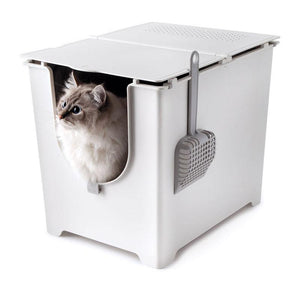
4099 reviews
"This litter box keeps everything in, nothing gets out the sides."
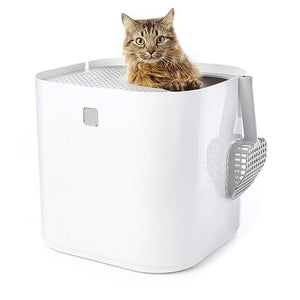
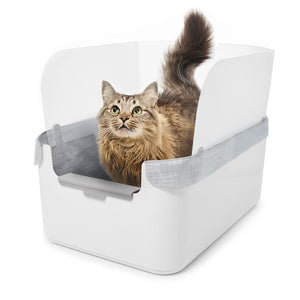
782 reviews
"My beautiful ragdoll cat and I both love the new Modkat Litter tray!"
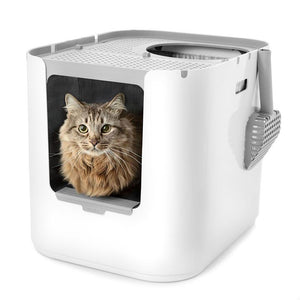
1901 reviews 
"It looks nicer than any other hooded or open option we considered."
















